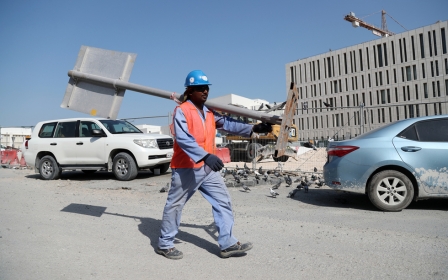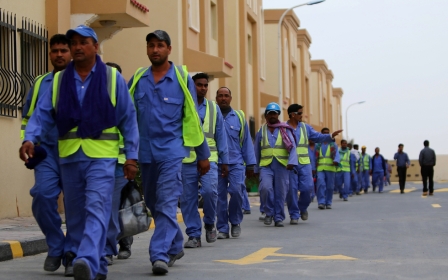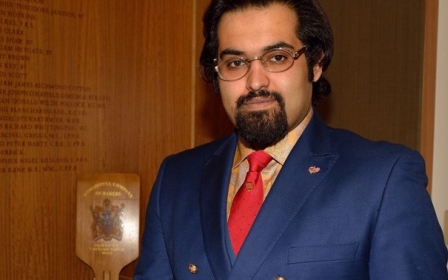World Cup 2022: Boss of firm behind report said Qatar 'bigger risk than Islamic State'

The head of a British-based management consultancy company behind a report warning that Qatar may lose the 2022 World Cup has previously described the Gulf state as a "terrorist organisation ruled by money-laundering Islamist terrorists" and is a staunch supporter of the Saudi-led blockade imposed against Qatar since June.
In other remarks posted on Twitter, Ghanem Nuseibeh, the founder of Cornerstone Global, said that the "civilised world needs to stand unwaveringly with Saudi Arabia in its fight against terrorism" and accused British journalists working for Qatari media organisations of being "inciters of terrorism".
In another tweet, he said that Qatar posed a bigger risk to Europe than either al-Qaeda or the Islamic State (IS) group.
Nuseibeh is also a supporter of Khalid Al-Hail, the self-styled Qatari opposition leader in exile, who last month organised a conference in London which was dismissed by one sceptic as a "remarkably amateurish and cack-handed attempt to gather support for a coup in Qatar".
Nuseibeh's tweets appear to raise questions about the impartiality of the Cornerstone report which, according to a BBC report on Friday, warns that the World Cup could be "abruptly cancelled" because of a political crisis in Qatar, potentially leaving companies working on tournament-related and other infrastucture projects out of pocket.
Cornerstone told the BBC the report was not funded by any government or company.
Titled "Qatar in focus: Is the Fifa World Cup 2022 in danger?" and citing "tournament insiders," the report said it was "far from certain" that Qatar would become the first Middle Eastern country to host the prestigious sporting event.
It said that any projects associated with the tournament were "high risk," according to the BBC, which said it had obtained a copy of the confidential document. It also said that the political crisis had raised the possibility of a Qatari opposition movement emerging.
"Any cancellation of Qatar hosting the World Cup 2022 will likely be abrupt and will leave contractors involved in a precarious situation that may not be easily resolved," the BBC quoted the report as saying.
Qatar's World Cup organising committee dismissed those concerns, saying the blockade had not had any impact on World Cup and related infrastructure projects, and questioned the motives behind the publication of the report.
"There is absolutely no risk to the future of the first World Cup in the Middle East," said Qatar 2022's Supreme Committee for Delivery and Legacy.
"In the context of the current political situation we question the motives of an organisation - which makes no secret of its affiliation to the countries blockading Qatar - of publishing a report based entirely on media reports and anonymous sources.
"The intention to create doubt regarding the tournament, while attempting to cause resentment amongst Qatari citizens and anxiety amongst foreign businesses and residents, is as transparent as it is laughable."
Nuseibeh has previously called for Qatar to be stripped of hosting rights.
In tweets on 25 August he said he was confident that Qatar would not host the tournament and said that the sooner the plug was pulled the better.
Saudi Arabia, the United Arab Emirates, Bahrain and Egypt all suspended ties with Qatar in June over what they called its "support for extremism and terrorism" - an accusation that Qatar denies.
They have called on Doha to cut its ties with Iran and to shut down the Al Jazeera media network, among other demands, in order for the blockade to be lifted.
Nuseibeh's support for the Saudi-led campaign include a tweet on 9 September in which he described Qatar as "the world's biggest state funder of Muslim brothers, Isis & Alqaeda".
Two days later, he wrote: "Qatar is no longer a state: it is not even a rogue state, it is a terrorist organisation ruled by money-laundering Islamist terrorists."
On the same day, he also said that al-Hail, the organiser of last month's "Qatar, Global Security and Stability Conference" deserved "full support".
He has also called repeatedly in posts for the UK to ban the Muslim Brotherhood, and he said earlier this week that if an Islamic State claim of responsibility for a mass shooting in Las Vegas proved to be true that "ultimate responsibility" would lie with the Brotherhood.
Qatar, a desert peninsula of 2.5 million people which has never qualified for the World Cup, has been under scrutiny since being controversially awarded the tournament in 2010.
Concerns have been raised about the bidding process by which Qatar won hosting rights, while preparations for the tournament have also focused attention on the abusive working conditions endured by migrant labourers working on the country's construction sites.
But Nicholas McGeehan, a former Human Rights Watch researcher who wrote the organisation's most recent report on migrant workers in Qatar, told Middle East Eye that Nuseibeh's comments on social media raised questions about the way in which the Cornerstone report had been "leaked".
"It's clear that Saudi Arabia and the UAE are looking to attack Qatar and see it stripped of the 2022 tournament," McGeehan said.
"Judging by the tone and content of some of Cornerstone founder and director's comments on social media, I think people should first ask who commissioned and paid for this report."
Chris Doyle, director for the Council for Arab-British Understanding, told MEE the report was part of a "sad trend" of "massively partisan comment" fuelled by the Gulf crisis in which "various parties are more intent on escalating matters, rather than concentrating on resolving it and trying to solve the differences in a region that cannot afford another crisis".
"Solid analysis of what is going on the Gulf is certainly needed but not some rather childish tit-for-tat PR operations that really have no merit at all," he said.
A profile of Nuseibeh in Abu Dhabi's The National newspaper in 2011 described him as a "Facebook addict partial to purple suede shoes and pink Polo shirts" and "the man investment bankers, business executives and even government officials turn to when they want to know what is happening in the Arab world".
Nuseibeh on Thursday called for the 2022 World Cup to be moved to England, saying it was "increasingly unlikely" that Qatar would host the tournament.
Nuseibeh told Middle East Eye that Cornerstone's report was "an objective report by professionals whose personal opinions do not impair their professionalism" and said that concerns expressed by Qatari officials about the report were "in line with the report's main qualitiative overall findings.
"Risks have clearly gone up over the past few months and the report highlighted this objectively," he said.
-->Middle East Eye delivers independent and unrivalled coverage and analysis of the Middle East, North Africa and beyond. To learn more about republishing this content and the associated fees, please fill out this form. More about MEE can be found here.




